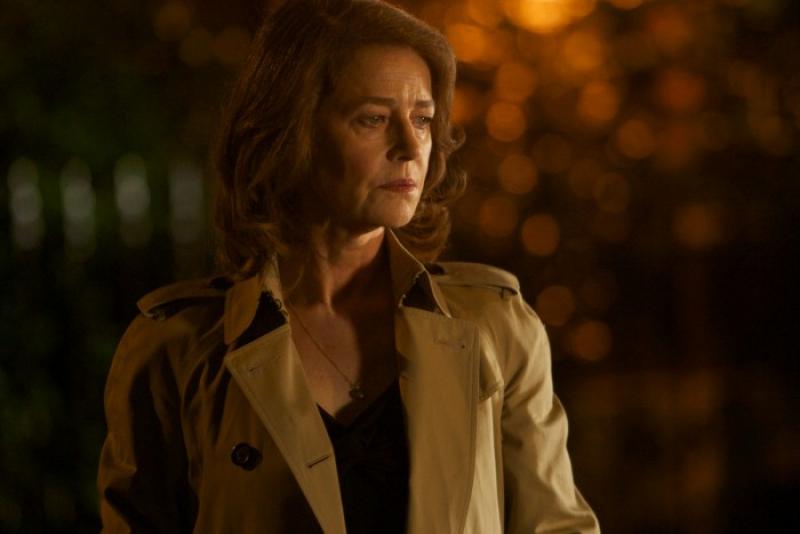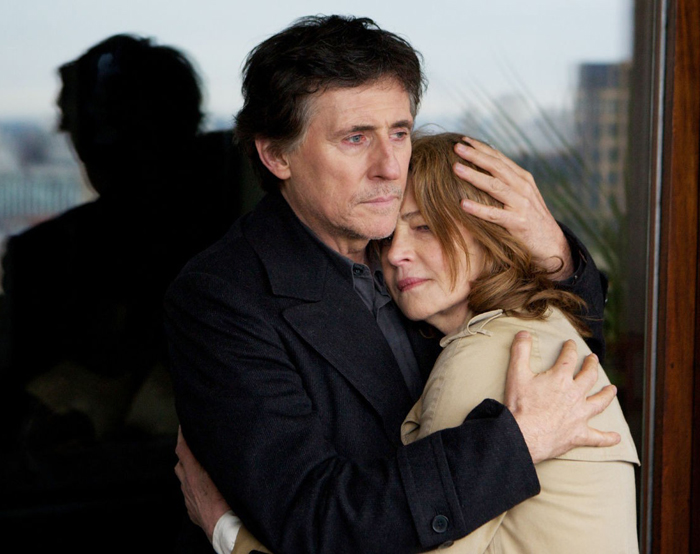I, Anna | reviews, news & interviews
I, Anna
I, Anna
Visually elegant London noir fails to give its characters the same nuance as its cityscapes

There are very few examples in film history of a son directing his mother, and there’s a distractingly Oedipal vibe at the core of Barnarby Southcombe’s I, Anna that might offer some clue as to why. Charlotte Rampling turns in a brittle, enigmatic performance in her son’s big-screen debut, playing the eponymous divorcee whose attempt to become sexually bold goes violently awry.
Anna attends a singles evening initially with trepidation, but gains momentary courage from a straight-talking fellow single (Honor Blackman), who encourages her to loosen up. She goes home with a man. Cut to the next morning: the man is found dead in his flat, and elsewhere Anna goes about her day, seemingly with no memory of what happened. We experience the lost hours of the night as she does – initially they go unseen, then gradually unfold in hazy, ambiguous snatches.
This is an unusual film, a visually bold film, the kind of film Britain seldom makes
Enter Gabriel Byrne’s weary-eyed insomniac chief detective Bernie, who sees Anna near the crime scene and begins following her. It’s initially unclear whether his obsession with her is investigative or romantic, and the line begins blurred further when he tracks her down to another singles event and makes contact.
The relationship intrigues initially because of its worrying ambiguity. Before Anna blurs into femme fatale territory, with her insta-iconic trench coat and apparently violent past, she’s introduced to us first and foremost as painfully lonely. The possibility that Bernie is merely exploiting her vulnerability for the sake of the case – for despite Byrne's inherently reassuring presence, his motives remain under-explored – gives their early interactions a painful frisson.
 The central murder mystery never holds the same interest and in fact reveals itself to be essentially a red herring, used only as a sharp tool with which to delve into Anna’s troubled psychology. Rampling is fascinating and unsettling and often moving in the role, but she’s cheated by a third-act twist that goes for shock without revealing anything human.
The central murder mystery never holds the same interest and in fact reveals itself to be essentially a red herring, used only as a sharp tool with which to delve into Anna’s troubled psychology. Rampling is fascinating and unsettling and often moving in the role, but she’s cheated by a third-act twist that goes for shock without revealing anything human.
It’s I, Anna’s visuals that stick with you rather than its human story, and given Southcombe’s small-screen background, credit must presumably go largely to cinematographer Ben Smithard (My Week With Marilyn). The London he and Southcombe create is unlike any version of the capital you’ve seen before; a sparse, imposing landscape of vast apartment buildings and bold architecture, all chilly greys and blues.
Southcombe wears his influences on his sleeve, from 1970s French noir to David Fincher’s Se7en and Zodiac, and yet his film is determinedly timeless, even anachronistic. All the signs point to a modern day setting, but Anna consistently uses phone boxes to make her calls – all the better for striking a poster-worthy pose, but indicative too of a character who is frozen in time, unable to move beyond some past trauma.
In the end this is an unusual film, a visually bold film, the kind of film Britain seldom makes, and a film that hits on some painful, largely unspoken truths about aging and isolation. For all this he deserves credit. But I, Anna still never grips with the ferocity you want it to, and its characters – despite a pair of fine lead performances – remain inpenetrable ciphers, lacking the shading and nuance of Southcombe’s haunting cityscapes.
The future of Arts Journalism
You can stop theartsdesk.com closing!
We urgently need financing to survive. Our fundraising drive has thus far raised £49,000 but we need to reach £100,000 or we will be forced to close. Please contribute here: https://gofund.me/c3f6033d
And if you can forward this information to anyone who might assist, we’d be grateful.

Subscribe to theartsdesk.com
Thank you for continuing to read our work on theartsdesk.com. For unlimited access to every article in its entirety, including our archive of more than 15,000 pieces, we're asking for £5 per month or £40 per year. We feel it's a very good deal, and hope you do too.
To take a subscription now simply click here.
And if you're looking for that extra gift for a friend or family member, why not treat them to a theartsdesk.com gift subscription?
more Film
 Can I get a Witness? review - time to die before you get old
Ann Marie Fleming directs Sandra Oh in dystopian fantasy that fails to ignite
Can I get a Witness? review - time to die before you get old
Ann Marie Fleming directs Sandra Oh in dystopian fantasy that fails to ignite
 Happyend review - the kids are never alright
In this futuristic blackboard jungle everything is a bit too manicured
Happyend review - the kids are never alright
In this futuristic blackboard jungle everything is a bit too manicured
 Robert Redford (1936-2025)
The star was more admired within the screen trade than by the critics
Robert Redford (1936-2025)
The star was more admired within the screen trade than by the critics
 Blu-ray: The Sons of Great Bear
DEFA's first 'Red Western': a revisionist take on colonial expansion
Blu-ray: The Sons of Great Bear
DEFA's first 'Red Western': a revisionist take on colonial expansion
 Spinal Tap II: The End Continues review - comedy rock band fails to revive past glories
Belated satirical sequel runs out of gas
Spinal Tap II: The End Continues review - comedy rock band fails to revive past glories
Belated satirical sequel runs out of gas
 Downton Abbey: The Grand Finale review - an attemptedly elegiac final chapter haunted by its past
Noel Coward is a welcome visitor to the insular world of the hit series
Downton Abbey: The Grand Finale review - an attemptedly elegiac final chapter haunted by its past
Noel Coward is a welcome visitor to the insular world of the hit series
 Islands review - sunshine noir serves an ace
Sam Riley is the holiday resort tennis pro in over his head
Islands review - sunshine noir serves an ace
Sam Riley is the holiday resort tennis pro in over his head
 theartsdesk Q&A: actor Sam Riley on playing a washed-up loner in the thriller 'Islands'
The actor discusses his love of self-destructive characters and the problem with fame
theartsdesk Q&A: actor Sam Riley on playing a washed-up loner in the thriller 'Islands'
The actor discusses his love of self-destructive characters and the problem with fame
 Honey Don’t! review - film noir in the bright sun
A Coen brother with a blood-simple gumshoe caper
Honey Don’t! review - film noir in the bright sun
A Coen brother with a blood-simple gumshoe caper
 The Courageous review - Ophélia Kolb excels as a single mother on the edge
Jasmin Gordon's directorial debut features strong performances but leaves too much unexplained
The Courageous review - Ophélia Kolb excels as a single mother on the edge
Jasmin Gordon's directorial debut features strong performances but leaves too much unexplained
 Blu-ray: The Graduate
Post #MeToo, can Mike Nichols' second feature still lay claim to Classic Film status?
Blu-ray: The Graduate
Post #MeToo, can Mike Nichols' second feature still lay claim to Classic Film status?

Add comment